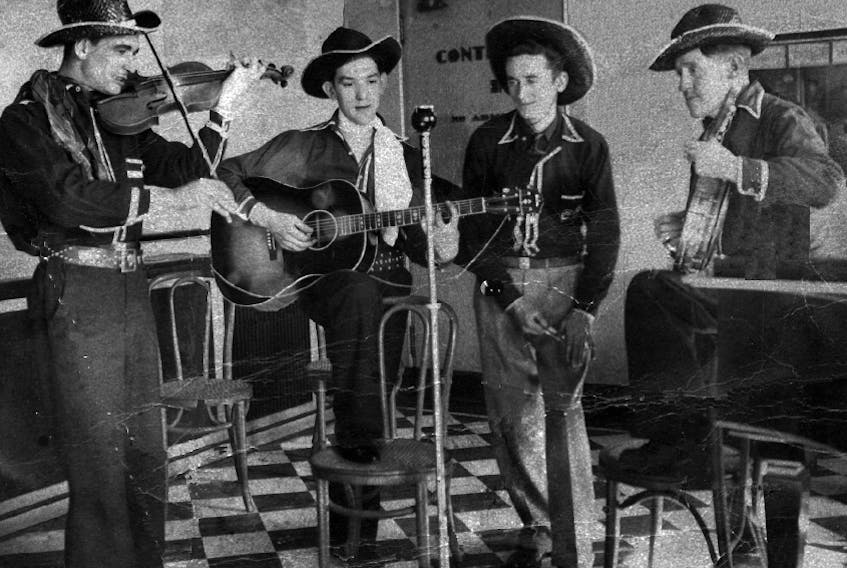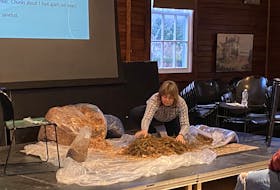SYDNEY, N.S. — In 1930, a 16-year-old Winston (Scotty) Fitzgerald began leaving his home in White Point to learn more about fiddle music in nearby Black Point.
Black Point was a half-hour away from White Point. But perched on the northern-most tip of Cape Breton, it would have seemed much farther back then. Its nickname, “Little Hell,” may have had something to do with that as well.
In addition to being the centre of the moonshine-making business, Black Point was home to a feisty group of Scottish settlers known for speaking Gaelic and playing the fiddle. Fitzgerald, of Irish and Acadian ancestry, started visiting the place regularly, probably for the moonshine originally but also because he was a devoted student of fiddle music.
It’s just one of the interesting tidbits you’ll pick up while listening to the first segment of "The Folk" — "Nova Scotia: A Rising Tide” — now available as a podcast . Each episode took about 100 hours to create with folk musician and ethnomusicologist Mike Tod from Calgary doing all the research, writing and production for each hour-long segment (the Fitzgerald episode rings in around 84 minutes). Tod is also a member of the old-time duo Godfrey & Tod.
LISTEN
“What I find intriguing is the story behind the music,” says Tod. “I’ve been interested in folk music my whole life.”

Tod’s 13-part series focuses on one notable musician from each province and territory, and the first features the life of Fitzgerald.
When you consider all the great musicians that Nova Scotia has produced, Tod says it was the natural choice.
“Most of the threads, most of the roads, seemed to lead back to Winston as a person who really threw out the book on what Cape Breton fiddle music was at this time and then tried to rewrite that book in a way, playing in crazy keys, like Eb and Bb, really tricky third position kind of stuff which had not really been common on the island prior to him and Angus Chisholm, who is another fiddler that I talk about in the episode,” says Tod. “Ultimately from what my understanding is, a lot of what takes place today, a lot of the players that exist today, would not have existed if it weren’t for a person like Winston (Scotty) Fitzgerald. So that’s why I chose to focus on him.”
Part of Fitzgerald’s unique style is that while he learned from everyone, he didn’t sound like anyone else, which, as any musician knows, is no mean feat. In addition to the songs learned from his parents who were musicians known for holding great parties and the rugged, more embellished fiddling style of the Black Pointers, Fitzgerald also paid close attention to his school teacher, Angus Chisholm who taught music in the Cape North school.
Chisholm was another well-known fiddler and had also studied in Boston. He was also one of the first Nova Scotians to be recorded commercially, on the Decca label. He was most popular fiddler on the East Coast at that time and according to Tod, you were either a Fitzgerald fan or a Chisholm fan.
“Angus Chisholm is the other Cape Breton fiddler’s fiddler of the early 1900s,” he says in the podcast. “You either go for Winston or you go for Angus, basically. It wasn’t like a rivalry or anything like that; just more like a Pepsi or Coke kind of thing. It was a preference.”

The podcast goes on to describe Fitzgerald’s two years spent as a fiddler with Hank Snow and how Fitzgerald’s talent became a problem for the country singer.
“Winston’s sound, Winston’s playing… people go crazy over Winston. He starts stealing the shows even though he never means to, and this is a problem for Hank who is supposed to be the star of the show and whose name, and ego, is on the line,” Tod says in the podcast. “Their relationship is brief and choppy, but what’s interesting is that Hank clearly did come around to recognize and indirectly admit that Winston was one amazing fiddle player. When Hank gets ready to leave Nova Scotia, he asks if Winston will continue fiddling for him. Winston says no … I do think he clearly wasn’t prepared to pour his life into someone else’s dream. Hank Snow would eventually work his way down to Nashville and become world famous, with a musical career spanning over five decades and record sales of over 80 million copies. Winston Fitzgerald stayed in Halifax and started working at a shipyard.”
And that wasn’t his only day job. Despite his success as a musician, Fitzgerald still worked full-time as a carpenter, a cook and an aluminum sider to keep food on the table.
Tod says he could do an episode just on unique fiddle styles for every province and territory but there is something about Fitzgerald and his ongoing legacy that needed to be explained.
“There’s a lot of more uninteresting fiddlers out there than there are unique and interesting ones and Winston to me, to my ear, is an example of a very interesting fiddler,” Tod says. “He really embellishes, really soaks up and rings out the melody and makes the most out of it and what would be described as maybe a dirty kind of style, adding a lot of ornamentation and things of that nature … it makes it so interesting to the ear. I got curious: how did he arrive at a point in his playing? And the story of how he got in touch with this style, the repertoire, to me was a totally fascinating story.’’
A new episode of "The Folk" will be released every Thursday and it’s free — you can read or listen to it.
The Northwest Territories’ Métis guitarist Elsie Justice is being featured on the next instalment of the podcast, available now on the usual platforms.









